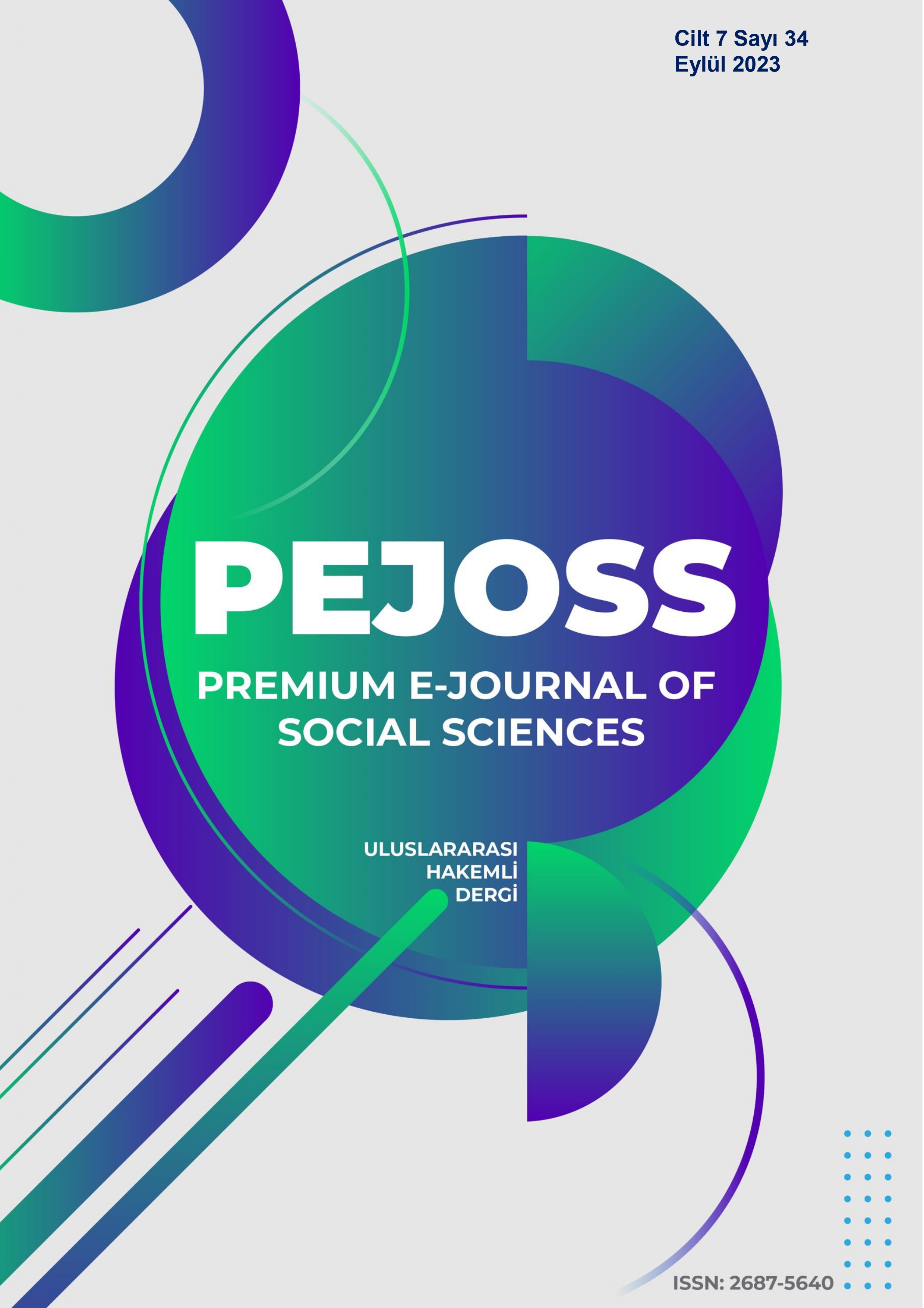Teachers' Attitudes Towards Distance Education
DOI:
https://doi.org/10.5281/zenodo.8404915Keywords:
Distance education, attitude, teacher, synchronous, asynchronous, interactionAbstract
This research, which was conducted to reveal teachers' attitudes towards distance education and its situation according to demographic characteristics, was conducted in a survey model and as a quantitative study. In the 2023-2024 academic year, data was collected from 234 teachers working in public schools in the Denizli Honaz district with the easily accessible sampling method. In the research, frequency, mean, t test, variance analysis and Post Hoc Tukey tests were performed. The highest level regarding teachers' attitudes towards distance education is "Access to information is quick in distance education because knowledge is shared on the internet." It is in the article. “Distance education provides effective learning through audio, visual designs and technology.” article follows. The lowest average is "Face-to-face education is more useful than distance education." It is in the article. It was observed that teachers' attitudes towards distance education sub-dimensions were highest in the advantage dimension, followed by the limitation dimension, while their general attitude was "I Disagree". According to the findings, it was seen that teachers' attitudes towards distance education sub-dimensions were negative and very negative. It has been observed that teachers' attitudes towards distance education are in the advantage dimension according to gender, and in general, the average of women is significantly higher than men. It was found that there was a difference between teachers aged 31-40 and teachers aged 51 and over in the advantage dimension according to their age, and the attitudes of teachers aged 51 and over towards the advantages of distance education were more negative. It has been observed that teachers' distance education attitudes are limited according to their marital status and that single students have higher averages than married people in general attitudes. It has been observed that there is a significant difference in the advantage dimension according to education levels, and the difference is high in favor of postgraduate graduates, and postgraduate graduates have higher positive attitudes toward the advantages of distance education compared to undergraduate graduates. It was concluded that there was a significant difference in the limitation dimension according to the levels they worked at and that the difference was between teachers working in secondary schools and high schools, and that their attitudes were more positive in favor of teachers working in secondary schools. There was a significant difference in the advantage dimension and limitation dimension according to career title.
Downloads
References
Aktaş, Ö. (2008). Uzaktan eğitim teknolojileri ve kullanım yeterlilikleri. [Yüksek lisans tezi], Eğitim Bilimleri Enstitüsü, Marmara Üniversitesi.
Bartlett, J.D., Griffin, J.L., Thomson, D. (2020). Resources for supporting children’s emotional well-being during the COVID-19 pandemic. COVID-19 Publications by UMass Chan Authors. Erişim adresi: https://escholarship.umassmed.edu/covid19/5
Bozkurt, A. (2020). Koronavirüs (Covid-19) pandemisi sırasında ilköğretim öğrencilerinin uzaktan eğitime yönelik imge ve algıları: Bir metafor analizi. Uşak Üniversitesi Eğitim Araştırmaları Dergisi, 6(2), 1-23.
Bozkurt, A., Sharma, R. C. (2020). Emergency remote teaching in a time of global crisis due to CoronaVirus pandemic. Asian Journal of Distance Education, 15(1), i-vi. https://doi.org/10.5281/zenodo.3778083
Can, E. (2020). Coronavirüs (Covid-19) Pandemisi ve Pedagojik Yansımaları: Türkiye’de Açık ve Uzaktan Eğitim Uygulamaları. Açıköğretim Uygulamaları ve Araştırmaları Dergisi, 6(2), 11-53
D’Orville, H. (2020). COVID-19 causes unprecedented educational disruption: Is there a road towards a new normal?. Prospects, 1-5. https://doi.org/10.1007/s11125-020-09475-0
Daniel, J. (2020). Education and the Covid-19 pandemic. Springer.
Derin Yoksulluk Ağı ve Açık Alan Derneği, (2020). Pandemi döneminde derin yoksulluk ve haklara erişim araştırması: Yerel yönetimlere kriz dönemi sosyal destek programları için öneriler. Erişim adresi: https://derinyoksullukagi.org/wp-content/uploads/2020/11/Pandemi-doneminde-derin-yoksulluk-ve-haklara-erisim-arastirmasi-Yerel-Yonetimlere-Kriz-Donemi-Sosyal-Destek.pdf.
Executive Board Resolution (EBR) on EI’s Response to the Covid-19 Pandemic. The Executive Board Of Education International, Meeting Online On 3 April 2020.
Eygü, H., Karaman, S. (2013). Uzaktan eğitim öğrencilerinin memnuniyet algıları üzerine bir araştırma. Kırıkkale Üniversitesi Sosyal Bilimler Dergisi, 3(1), 36-59.
Gök, B. (2017). Üniversitelerde uzaktan eğitim programlarının hizmet kalitesi ve etkinliğinin değerlendirilmesi, [Yayınlanmamış doktora tezi], Eğitim Bilimleri Enstitüsü, Gazi Üniversitesi.
Gökçe, A. T. (2008). Küreselleşme sürecinde uzaktan eğitim. D.Ü.Ziya Gökalp Eğitim Fakültesi Dergisi(11), 1-12.
Güven, C. A. (2017). Uzaktan eğitimin önemi ve örnek bir dersin sınav uygulaması. https://www.researchgate.net/profile/Cansu-Gueven/publication/330688938_UZAKTAN_ EGITIMIN_ONEMI_VE_ORNEK_BIR_DERSIN_SINAV_UYGULAMASI/ links/5c4f78ffa6fdccd6b5d15e66/UZAKTANEGITIMIN-OeNEMI-VE-OeRNEK-BIR-DERSIN-SINAV-UYGULAMASI.pdf
İşman, A. (2011). Uzaktan Eğitim. Pegem Akademi.
Kalaycı, Ş. (2016). SPSS uygulamalı çok değişkenli istatistik teknikleri. Asil.
Karasar, N. (2016), Bilimsel Araştırma Yöntemi, Nobel Yayınları
Kantos, Z. E. (2020). Sınıf öğretmenlerinin uzaktan eğitim ile ilgili düşünceleri. 8. Uluslararası Bilimsel Araştırmalar Kongresi. Hattuşa, Çorum, Türkiye.
Kavrat, B., Türel, Y. (2013). Çevrimiçi uzaktan eğitimde öğretmen rollerini ve yeterliliklerini belirleme ölçeği geliştirme. Journal of Instructional Technologies and Teacher Education, 2(2), 23-33.
Kaya, Z. (2002). Uzaktan eğitim. Pegem Akademi.
Koyunoğlu, F. (2008). Sistem yaklaşımı açısından uzaktan eğitim: İnönü Üniversitesi Uzaktan Eğitim Merkezi model önerisi. [Yüksek lisans tezi], Eğitim Bilimleri Enstitüsü, İnönü Üniversitesi
Moore, M., & Kearsley, G. (2012). Distance education: a systems view of online learning. (3nd ed.) Wadsworth.
Nasir, M. (2020). Impact of the 2019-20 coronavirus pandemic on education. International Journal of Health Prefences Research. doi: 10.13140/RG.2.2.27946.98245
Özgöl, M., Sarıkaya, İ., & Öztürk, M. (2017). Örgün eğitimde uzaktan eğitim uygulamalarına ilişkin öğrenci ve öğretim elemanı değerlendirmeleri. Yükseköğretim ve Bilim Dergisi, 2, 294-304. https://dergipark.org.tr/tr/pub/higheredusci/issue/61493/918176
Peragine, V. ve Serlenga, L. (2008). Higher education and equality of opportunity in Italy. Research on Economic Inequality, 16, 67-97.
Pınar, M. A. ve Akgül, D. G. (2020). The opinions of secondary school students about giving science courses with distance education during the Covid-19 pandemic. Journal of Current Researches on Social Sciences, 10(2), 461-486.
Tavukçu, T., Arap, İ., & Özcan, D. (2011). General overview on distance education concept. Procedia Social and Behavioral Sciences, 15, 3999-4004. https://doi.org/10.1016/j.sbspro.2011.04.404
Telli, S. G., Altun, D. (2020). Coronavirüs ve Çevrimiçi (online) Eğitimin Önlenemeyen Yükselişi.
Toprakçı, E. (2008). Sınıfa dayalı yönetim. , Pegem Akademi.
Yassıbaş, E. C. (2021). Sınıf öğretmenlerinin uzaktan eğitim hakkındaki tutumlarının incelenmesi. [Yüksek Lisans Tezi], Sağlık Bilimleri Enstitüsü, Üsküdar Üniversitesi.
Yenal, A. Ç. (2009). Uzaktan eğitim. [Yüksek lisans tezi], Eğitim Bilimleri Enstitüsü, Yeditepe Üniversitesi
Downloads
Published
How to Cite
Issue
Section
License
Copyright (c) 2023 Premium e-Journal of Social Science (PEJOSS)

This work is licensed under a Creative Commons Attribution 4.0 International License.


